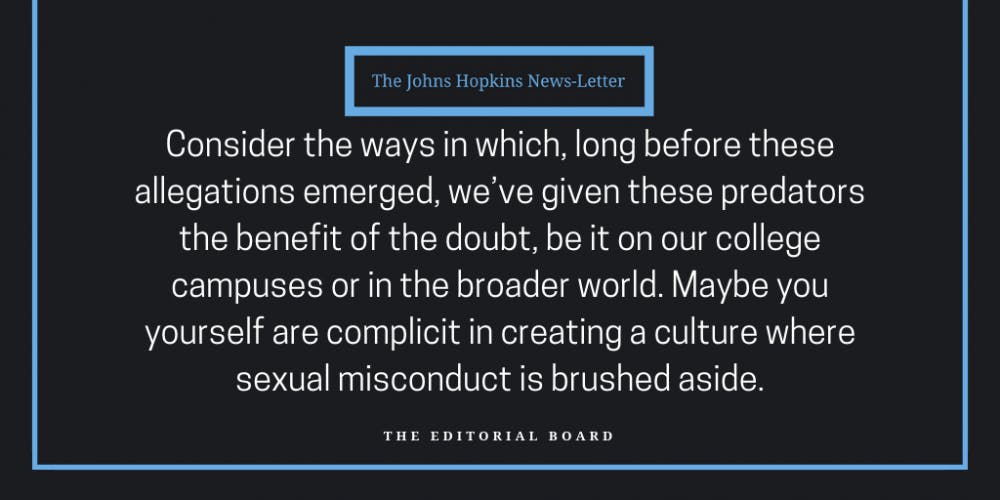Recently, three women have accused Supreme Court nominee Brett Kavanaugh of sexual assault. We’ve been watching his appointment hearings with anticipation.
The three women -- Christine Blasey Ford, Deborah Ramirez and Julie Swetnick -- are currently in their 50s, and the alleged assaults happened when they and Kavanaugh were teenagers in the ‘80s. Ford said she was 15 years old when Kavanaugh tried to rape her at a house party. According to Ramirez, she was a freshman at Yale University when Kavanaugh assaulted her at a dormitory party. Swetnick alleges that she witnessed Kavanaugh participating in gang rapes and that she was raped when he was present.
Now many, including U.S. President Donald Trump, are asking these women a question that survivors have to put up with too often: why didn’t they come forward with these accusations sooner?
In response, another hashtag has emerged: #WhyIDidntReport.
Ford, Ramirez and Swetnick reference scenarios that we’re unfortunately all too familiar with. As the #MeToo movement unfolded over the past year, we saw survivor after survivor face intense public scrutiny as they came forward with their allegations; It probably wasn’t that bad. Was it really assault? Why didn’t you report this? Why didn’t you do anything to stop him?
Our fellow student journalists at Yale Daily News recently republished a picture of Kavanaugh’s Delta Kappa Epsilon (DKE) fraternity brothers at Yale waving a flag made of women’s underwear. Thirty years after Kavanaugh and a year after #MeToo, rape culture persists. It still pervades our college campuses, and Hopkins is by no way exempt. We live in a campus culture of white male privilege that enables the predatory behavior of the teenage Kavanaughs of today. When we witness that behavior we may often feel repulsed, but we’re rarely surprised.
Think about fraternity parties at Hopkins, where crowds of freshmen with higher women-to-men ratios are more likely to be let in. Think about how the fraternities are the ones with houses and the ability to throw huge parties, and how this might reinforce gender inequities on campus.
Think of the number of times you had to tell female friends to avoid such-and-such man — he’s creepy when he’s drunk. Think of how he was allowed to continue attending Hopkins with absolute impunity. Think about the number of times our male peers have made women on campus feel unsafe and the number of times they’ve gotten away with it.
Think about how one in four female undergraduates experience sexual assault before they graduate. Think about how more than 90 percent of survivors on college campuses do not report sexual assault.
And it’s not just students who are to blame for perpetuating rape culture. The University is also directly responsible for allowing this culture to survive. Last semester, we published a feature where student survivors of sexual violence demonstrated how the Office of Institutional Equity (OIE) has failed to offer them closure and protection from their abusers. It took years for the University to revoke Bill Cosby’s honorary degree, and it only did so when Cosby’s overdue guilty verdict was announced. And as Education Secretary Betsy DeVos continues to call for increasingly appalling measures to protect predators, administrators have done little to assure survivors that their stories will continue to matter.
If you’re one of the people asking why Ford, Ramirez and Swetnick couldn’t have come forward sooner, read what our senators, our nation’s president (an alleged abuser himself) and your acquaintances are saying to bring these women down. Consider the ways in which, long before these allegations emerged, we’ve given these predators the benefit of the doubt, be it on our college campuses or in the broader world. Maybe you yourself are complicit in creating a culture where sexual misconduct is brushed aside.
The Kavanaugh hearings matter not only because of the implications they have for our judicial system, but also for how they determine the ways in which we address sexual violence going forward. As we watch Kavanaugh’s hearings unfold over the coming weeks, we must remember that the rape culture at Hopkins, Yale and numerous other schools is not just a product of the ‘mistakes’ that teenagers make.
Harvey Weinstein. Kevin Spacey. Louis C.K. Brett Kavanaugh. Rape culture in the real world mirrors rape culture on our college campuses. So think about the ways you contribute to rape culture. And if you’re an abuser, know that the crimes you commit will matter in the future. You might choose to forget, but your survivors will not.





